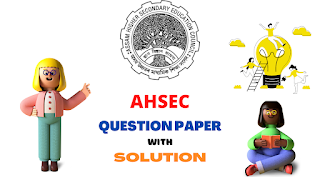AHSEC| CLASS 12| LOGIC AND PHILOSOPHY| SOLVED PAPER - 2023| H.S. 2ND YEAR
2023
LOGIC AND PHILOSOPHY
Full Marks: 100
Pass Marks: 30
Time: Three hours
The figures in the margin indicate full marks for the questions.
1. Give very short answers: 1x12=12
(a) What is
the subject matter of Logic?
Ans:- The
subject matter of logic includes proposition, implication, implication,
inference, validity, soundness, and consistency.
(b) Is
Deductive Inference concerned with Material Truth?
Ans:- No,
the object of deductive inference is only formal truth.
(c) Are the events fully under the
control of the observer in Observation?
Ans:- Participants are not aware that observation
and research is being conducted, even though they fully interact with the
researcher.
(d) Does
Unscientific Induction depend on the Law of Causation?
Ans:- Thus,
unrestricted experience is the basis of unscientific induction. Unscientific
inference is not based on the law of causality. The conclusion of unscientific
induction is only probable.
(e) What is
the third state of Hypothesis?
Ans:- The
third step is to carry out the planning and physical analysis of the sample
data.
(f) Name the
Philosopher who used the term ‘Naïve Realism’ for the first time.
Ans:- Social psychologist Lee Ross.
(g) What is
the ideal of Ethics?
Ans:-
Ethics means the science of human customs or habits. It evaluates the voluntary
actions and habitual actions of individuals and considers whether they are
right or wrong.
(h) Give an
example of Primary quality.
Ans:- Thus
colour, taste, smell, heat and cold.
(i) Which
principle of elimination forms the basis of Method of Agreement?
Ans:- The
principles of elimination which form the basis of the method of compromise are
- "Whatever antecedent may be omitted without prejudice to the effect
cannot be part of the cause."
2. What do you mean by ‘Induction improperly so
called’? 2
Ans:- "Induction wrongly so-called" refers
to an argument that appears to be inductive but is built on assumptions or
ideas rather than on particular observations or data.
Or
Why is the
conclusion of Unscientific Induction not certain? 2
Ans:- Unscientific
conjecture merely establishes a general proposition on the basis of similar or
unrestricted experience. In unscientific inference, no attempt is made to
explain the causal relationship. So, its conclusion is only possible.
3. What are the two forms of ‘Law of Uniformity of
Nature’? 2
Ans:- There are two forms of uniformity of nature. They
are :- i) Uniformity of succession. ii) Symmetry of coexistence.
Or
What is
material cause? Give an example. 2
Ans:- Material
Cause: "That out of which" it is made. Efficient Reason: The source
of the principle of change or permanence of things. Formal reason: the essence
of the object. Final Cause: The end/goal of the object, or what the object is
good for. For example, the bronze of a statue, the letters of one syllable.
4. Mention any two conditions of a valid hypothesis. 2
Ans:- A scientific hypothesis must meet two criteria:
a scientific hypothesis must be testable, and a scientific hypothesis must be
falsifiable.
5. Why is Loke’s Realism known as ‘Scientific
Realism’? 2
Ans:- Locke's distinction between primary and
secondary qualities explains the scientific nature of external objects. He says
that we can know an object only from its representational copy. Therefore, Locke's
scientific realism is also considered representationalism.
6. Give an example of ‘hypothesis concerning agent’. 2
Ans:- Hypothesis regarding agent: - The law may be
known but it may also happen that the particular agent acting according to this
known law is unknown. In such a situation, we formulate a hypothesis about the
agent. For example, the planet Neptune was discovered by a similar hypothesis.
7. Mention two characteristics of ‘Naive Realism.’ 2
Ans:- According to Naive Realism, our thoughts are
exact copies of external real objects and their properties. All the properties
of matter are real things. He himself is present in things. Thus colour, taste,
smell, heat and cold are absolute and objective as are expansion, permeability,
motion, relaxation etc.
8. Why is Ethics called a normative science? 2
Ans:- Ethics is a normative science that examines
moral principles and behavior. It is concerned with the determination of right
and wrong, good, and bad in human conduct. It not only explains how people
behave but it also evaluates and judges their behavior based on moral
standards.
9. Define Idealism.
2
Ans:- Idealism is a metaphysical view that links
reality to ideas in the mind rather than physical objects. It emphasizes the
mental or spiritual components of experience and rejects the notion of physical
existence.
Or
Name two
idealistic philosophers. 2
Ans:- Beginning
with Immanuel Kant, German idealists such as Georg Wilhelm Friedrich Hegel,
Johann Gottlieb Fichte, Friedrich Wilhelm Joseph Schelling, and Arthur
Schopenhauer dominated 19th-century philosophy.
10. Give an example of Fallacy of Mal observation. 2
Ans:- Mal observation is an illusion resulting from
misinterpretation of sense perception. For example - in the dark night
we sit thinking the rope as a snake.
[Coming soon]
***
LOGIC & PHILOSOPHY SOLVED PAPERS PAGE LINK - Click here
BUY E-BOOK (PDF FILE)
[TO SEE FULL SOLUTION]
(Chapter wise Notes, Exam Question Papers solved, MCQ solved) [ARTS, COMMERCE, SCIENCE]
|
DOWNLOAD PAGE LINK:-CLICK HERE |
AHSEC PAGE LINK - CLICK HERE

